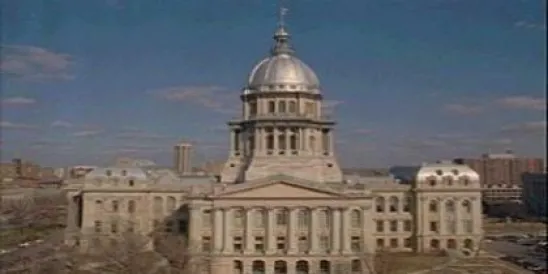On April 29, Illinois Governor J.B. Pritzker released proposed legislation, SB2896 and HB4074, to set statewide minimum, uniform standards for wind farms and ground-mounted solar energy systems, including setback requirements, height restrictions, and landscape buffer requirements, while maintaining local authority over permitting and final project approval. Currently, Illinois counties have the authority to set all standards and siting procedures for wind and solar energy facilities.
The proposal sets minimum standards for commercial wind farms including minimum distances from nearby property boundaries, residences, and roadway right-of-ways, referred to as “setback requirements.” Standards are also set for modeled hours of shadow flicker experienced by community buildings or residences on properties that have not agreed to host a wind turbine or supporting facility (“non-participating properties”), and height restrictions. For example, a county may not set a blade tip height limit more restrictive than the height allowed under a Federal Aviation Administration Determination of No Hazard. According to the proposal, minimum requirements may be waived subject to the written consent of the affected non-participating landowner.
For ground-mounted solar energy systems, counties may not set standards more restrictive than those set forth in the proposal, which include setback requirements from roadway right-of-ways and non-participating residences, and landscape buffers when solar energy systems are located within 250 feet of the nearest non-participating property.
Public comment opportunities are required for the siting approval or special use permit issuance for both wind farms and solar systems. The proposal also intends to speed up wind and solar energy development by setting timeframes for counties to set public hearings and issue siting decisions.
The proposed bill does not apply to systems that began construction or were approved prior to the bill’s effective date. Further, counties with wind farm and/or solar energy system zoning ordinances that do not comply with the provisions in the bill would be required to amend their ordinances within 180 days of the effective date of the legislation.
The proposal is part of a massive energy bill (SB2896/HB4074), the Consumers and Climate First Act, which the Governor’s Office claims paves the way for the State of Illinois to reach its goal of transitioning to 100 percent clean energy by 2050. The 900+ page bill proposes to set new consumer protections, revise the Illinois Renewable Portfolio Standards, set caps on greenhouse gas emissions, provide subsidies for nuclear plants, incentivize electric vehicle charging infrastructure, and establish a fee on carbon emissions from coal, gas, or oil-fueled generators (including industrial facilities).




 />i
/>i

